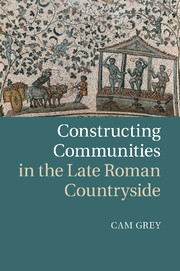Book contents
- Frontmatter
- Contents
- Preface
- List of abbreviations
- Map The late Roman world (sites and regions discussed in the text)
- Introduction
- Chapter 1 Constituting communities
- Chapter 2 What really matters
- Chapter 3 Small politics
- Chapter 4 Power as a competitive exercise
- Chapter 5 Resistance, negotiation, and indifference
- Chapter 6 Creating communities
- Chapter 7 Unintended consequences
- Conclusions
- Bibliography
- Index
Chapter 3 - Small politics
making decisions, managing tension, mediating conflict
Published online by Cambridge University Press: 07 September 2011
- Frontmatter
- Contents
- Preface
- List of abbreviations
- Map The late Roman world (sites and regions discussed in the text)
- Introduction
- Chapter 1 Constituting communities
- Chapter 2 What really matters
- Chapter 3 Small politics
- Chapter 4 Power as a competitive exercise
- Chapter 5 Resistance, negotiation, and indifference
- Chapter 6 Creating communities
- Chapter 7 Unintended consequences
- Conclusions
- Bibliography
- Index
Summary
The literary and documentary sources of the late Roman world evince relatively little interest in the internal workings of rural communities, and reveal mechanisms of self-regulation only rarely. But we must assume a diversity in social structures and patterns of interaction that matches the physical diversity of settlements sketched above. For analytical purposes, we may envisage two poles, and assume that in most cases a community will fall somewhere along the spectrum between the two. At one extreme may be placed the more or less egalitarian community of agriculturalists, characterized by relatively poorly developed structures of self-government, and collectively subject to a wealthy patron or landlord. At the other is the highly stratified village community, dominated by an exclusive oligarchy of wealthier peasants, who consciously excluded their less wealthy or powerful neighbors from the business of governing the community, and the status and recognition that this entailed. We should imagine also that the natural state of rural communities both large and small was a delicate equilibrium between the competing and largely contradictory needs of the individuals, households, and families that made up those communities on the one hand, and the cohesion of the group as an effective mechanism for the mitigation and management of subsistence and social risk, on the other. It will be the purpose of this chapter to explore the strategies available to communities in seeking to maintain this equilibrium.
To this end, I briefly sketch the evidence for social differentiation and self-governance within rural communities in the late Roman world. Next, I examine the decision-making processes of individuals and households in those communities, the constraints within which those decisions were made, and the collection of mutually contradictory demands that had to be balanced and evaluated in the process. Then I outline the ways in which inequality and internal tension might be negotiated, paying particular attention to regular mechanisms for the periodic alleviation of jealousy and conflict. Finally, I explore some strategies that these communities might employ for resolving disagreements or disputes that have escalated to a point where they require a specific response or solution. Throughout, I focus principally upon structures that may be considered intrinsic to the community, leaving discussion of their interactions with outsiders for a later chapter. As we shall see, while such a strategy is in a certain sense artificial, it has the benefit of emphasizing the primacy of the community’s cohesion and the subsistence survival of its members over the demands, perceptions, and desires of the powerful figures whose perspective has long dominated the study of rural communities in the period.
- Type
- Chapter
- Information
- Constructing Communities in the Late Roman Countryside , pp. 91 - 120Publisher: Cambridge University PressPrint publication year: 2011



